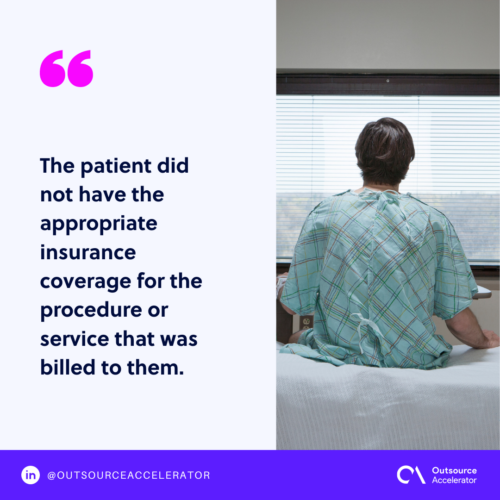Essential tips to reduce denials and generate revenue through orthopedic billing services

This article is a submission from the Physician Billing Company. Physician Billing Company provides outstanding billing services and offer innovative solutions that help you boost productivity and maximize cash flow.
When it comes to lowering the number of claims that are denied and increasing revenue, orthopedic billing services can be an excellent resource for healthcare businesses.
However, navigating the orthopedic billing process may be a difficult and time-consuming endeavor, not to mention one that is fraught with confusion.
Continue reading in order to begin improving the efficiency of your orthopedic billing processes right away, as we will cover a variety of subjects, including coding accuracy, medical necessity, payer requirements, and more.
What are some of the most typical reasons that orthopedic billing claims are rejected?
In orthopedic billing, there is a wide variety of potential reasons for a claim to be denied; nevertheless, some of the most typical reasons are as follows:
- The patient did not have the appropriate insurance coverage for the procedure or service that was billed to them. This is the most common reason for this type of claim denial.
- Failure to get necessary pre-authorization or pre-certification. Insurers will typically demand that certain procedures or treatments be pre-approved before they will pay for them. It is possible that the claim will be rejected if this step is skipped.
- Incorrect coding. This problem can arise if the biller utilizes the incorrect codes while reporting a process or service, which can lead to the claim being refused or rejected.
- Incomplete documentation. In order to process a claim, insurers frequently demand specific documentation from the policyholder. It is possible that the claim will be rejected if any of the relevant information is lacking.
- Claims that were filed after the stipulated time limit. The majority of insurers have a predetermined window of time within which claims must be filed. It is possible that a claim will be automatically rejected if it is received after the specified deadline.

How to turn orthopedic billing services into a revenue-generating endeavor and avoid denials?
Let’s explore the ins and outs of orthopedic medical billing and coding, including tips on how to generate more revenue, avoid denials, and ensure you’re both compliant with all regulations and maximizing your profits.
The revenue cycle
The revenue cycle for an orthopedic medical practice can be a complex and daunting task. There are a number of different steps involved in getting reimbursement from insurance companies and patients.
To ensure that your practice is maximizing its revenue, it is important to have a clear understanding of the revenue cycle and how to avoid common mistakes that can lead to denials.
The first step in the revenue cycle is billing. This is the process of submitting claims to insurance companies for reimbursement.
In order to get accurate reimbursement, it is important to use correct coding when submitting claims. Incorrect coding is one of the most common reasons for claim denial.
After claims have been submitted, insurance companies will process them and determine how much they will reimburse the practice. This decision is based on the contract negotiated between the insurance company and the practice.
If there are any discrepancies between what was billed and what was actually provided, the claim may be denied or only partially reimbursed.
Once payments have been received from insurance companies, they must be posted to patient accounts. This process can be time-consuming and errors can easily be made. If payments are not posted correctly, it can lead to delays in getting reimbursed from insurers.
The final step in the revenue cycle is the collection of patient payments. For patients with private insurance, this usually involves sending them a bill for their portion of the charges not covered by their insurer.
For patients with government health plans like Medicare or Medicaid, practices must follow specific
The billing process
Orthopedic medical billing can be a complex and time-consuming process. There are many different coding and documentation requirements that must be met in order to get reimbursed by insurance companies.
Here are some tips to help you generate more revenue and avoid denials in your orthopedic medical billing:
- Understand the requirements of each payer. Every insurance company has different coding and documentation requirements. Make sure you understand the specific requirements of each payer before submitting claims.
- Use accurate codes. Using the wrong codes can result in claim denials or reduced payments. Make sure you are using the most up-to-date codes when billing for services.
- Keep detailed records. Good documentation is essential for getting reimbursement from insurance companies. Make sure you keep detailed records of all procedures, treatments, and diagnoses.
- Bill promptly. Don’t wait too long to submit your claims, or you may run into delays in payment. Submit your claims as soon as possible after services are rendered.
- Follow up on denials. If your claim is denied, don’t give up! Follow up with the insurance company to find out why and resubmit the claim if necessary.

Claims management
The first step in successfully managing orthopedic medical billing is to understand how payers process claims.
Each payer has different requirements for claim submission, so it’s important to know the specific guidelines for each insurer. Once you have a clear understanding of the claim submission process, you can start looking for ways to optimize your claims management.
One way to optimize your claims management is by using electronic medical billing software. This software can help you automate many of the tasks involved in submitting claims, such as creating and submitting claim forms, tracking payments, and following up on denials.
By using medical billing software, you can save time and improve your chances of getting paid quickly and accurately.
Another way to improve your claims management is by hiring a billing service. A billing service can handle all aspects of claim submission for you, from start to finish.
This can take a lot of the stress and guesswork out of submitting claims, and increase your chances of getting paid on time.
If you’re looking for ways to generate more revenue and avoid denials in orthopedic medical billing, these tips can help. By understanding the claim submission process and taking steps to optimize your claims management, you can improve your bottom line.
Payment posting
There are a few key things you can do to make sure that your payments are posted correctly and in a timely fashion.
First, be sure to keep accurate and up-to-date records of all your payment transactions. This will help you spot any errors or delays in posting.
Second, be sure to follow up with your insurance company or third-party payer if there are any delays in payments
Finally, make sure to keep track of any changes in your insurance coverage or billing procedures so that you can make the necessary adjustments to your billing process.

Accounts receivable
Accounts receivable in orthopedic medical billing can be a challenge. There are many different types of procedures and even more ways that things can go wrong during the billing process.
However, by following a few simple tips, you can help to ensure that your accounts receivable are accurate and up-to-date.
First, always keep accurate records. This includes keeping track of all procedures performed, as well as any related diagnosis codes and treatment codes.
In addition, be sure to keep track of any changes in patient insurance information. Insurance companies frequently change their policies and requirements, so it is important to stay on top of any changes that could impact your billing.
Next, submit clean claims. When submitting claims to insurance companies, be sure to double-check all of the information for accuracy. A single mistake could result in a denial of the claim.
Further, be sure to include all required documentation with each claim. This may include procedure notes or other medical records.
Finally, follow up on denials promptly. If a claim is denied, don’t hesitate to reach out to the insurance company for clarification.
Oftentimes, there is simply a misunderstanding that can be easily resolved. However, if you let denials pile up without taking action, you will only end up further behind in your billing.
Denials management
Denials management is a crucial part of any medical billing process. By its very nature, denials management is the process of identifying, analyzing, and correcting errors in claims that have been denied by payers.
In orthopedic medical billing, denial management can be a complex and time-consuming process. There are a number of reasons why claims may be denied, including incorrect coding, missing information, or incorrect patient information.
To avoid denials and generate more revenue, it is important to have a strong understanding of the Orthopedic Coding Guidelines and to perform regular audits of your claims.
Additionally, working with a qualified medical billing service can help to ensure that your claims are accurate and complete before they are submitted to payers.

What steps may be taken to ensure that all necessary documentation is submitted?
The submission of accurate paperwork is among the most essential components of orthopedic billing. It is crucial that all relevant documentation is completed and presented in a timely manner in order to cut down on the number of claims that are denied.
The following are some suggestions to guarantee accurate documentation:
When reporting claims, you must at all times use coding that is accurate and up to date.
Before submitting a claim, check with the payer to ensure that you have included all of the necessary evidence.
Make sure to keep careful notes on each and every patient visit, procedure, and diagnosis.
It is important to follow up with patients after their appointments in order to collect any documents that may have been forgotten.
You may help to limit the number of claims that are denied and guarantee that your orthopedic practice is reimbursed in a timely manner if you follow these suggestions.
Conclusion
It is possible for orthopedic billing services to be an excellent strategy to raise income and decrease the number of claims that are denied.
You may enhance efficiency, accuracy, and compliance while avoiding costly errors that could result in lower reimbursements or outright denials of claims if you have the appropriate methods in place. If you put these suggestions into action, you should be able to ensure that you are able to utilize the benefits that orthopedic medical billing services provide for both yourself and your patients.







 Independent
Independent




